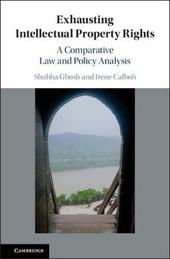
|
Exhausting Intellectual Property Rights: A Comparative Law and Policy Analysis
Hardback
Main Details
| Title |
Exhausting Intellectual Property Rights: A Comparative Law and Policy Analysis
|
| Authors and Contributors |
By (author) Shubha Ghosh
|
|
By (author) Irene Calboli
|
| Physical Properties |
| Format:Hardback | | Pages:226 | | Dimensions(mm): Height 236,Width 156 |
|
| ISBN/Barcode |
9781107115859
|
| Classifications | Dewey:346.048 |
|---|
| Audience | | Professional & Vocational | |
|---|
|
Publishing Details |
| Publisher |
Cambridge University Press
|
| Imprint |
Cambridge University Press
|
| Publication Date |
8 November 2018 |
| Publication Country |
United Kingdom
|
Description
Even as globalization seems to be in retreat in political circles, the march of commercialization and markets continues. Government policies, whether tariffs, exits, or walls, cannot impede the competitive drive to meet consumer demand for products and services, whether within national boundaries or across them. In the sphere of intellectual property rights, the doctrine of exhaustion serves to limit the rights of intellectual property owners after a specific exercise of some or all of the rights. This volume provides an assessment of the successes and failures of the exhaustion doctrine as it has been applied through recent judicial decisions in the United States and the European Union. Irene Calboli and Shubha Ghosh explore how evolving interpretations of the exhaustion doctrine affects the large trade in gray market products and other international trade issues. A comparative approach to exhaustion, Exhausting Intellectual Property Rights offers a unique discussion of the often overlooked issue of overlapping rights.
Author Biography
Shubha Ghosh is Crandall Melvin Professor of Law at Syracuse University College of Law and Director of the Technology Commercialization Law Center. He is the author of Identity, Invention, and the Culture of Personalized Medicine Patenting (Cambridge, 2012) and co-author of Transactional Intellectual Property: From Startups to Public Companies (2015) and Intellectual Property: Private Rights, the Public Interest, and the Regulation of Creative Activity (2016). Irene Calboli is Professor of Law at Texas A & M University School of Law and Transatlantic Technology Law Fellow at Stanford University. Her recent books include Diversity in Intellectual Property: Identities, Interests, and Intersections (Cambridge, 2015) and Geographical Indications at the Crossroads of Trade, Development, and Culture (Cambridge, 2017).
Reviews'A first-rate transnational survey on the exhaustion question addressing a range of critical issues.' Frederick Abbott, Edward Ball Eminent Scholar Professor of Law, Florida State University College of Law 'Great achievement by two prominent scholars! Drawing on case law, comparative law and clear examples and implications, Calboli and Ghosh have produced a first-class analysis of the intricacies of the key questions and the policies underlying the choice of exhaustion regime. Its comprehensive analysis of different IP regimes and the enlightening interactions with international trade, the digital environment, competition law, makes this instructive and attractively written book a must for policy makers, professionals and academics.' Pedro Roffe, Senior Fellow, International Center for Trade and Sustainable Development (ICTSD) 'This book addresses the most important feature of intellectual property rights from the perspective of international trade. Discussing a range of exhaustion topics - from recent changes in the US law of exhaustion to the challenges of exhaustion in the digital realm - Professors Ghosh and Calboli share their vast knowledge of comparative intellectual property law and offer a thoughtful overview of the complex landscape of the exhaustion principle.' Marketa Trimble, Samuel S. Lionel Professor of Intellectual Property Law, William S. Boyd School of Law, University of Nevada, Las Vegas "The authors have given us an invaluable treatise covering both the legal and economic aspects of the complex subject of parallel imports and the doctrine of exhaustion of intellectual property rights. This book - which is very readable - should be an essential resource for intellectual property scholars from the disciplines of both law and economics.' Jayashree Watal, Counsellor, Intellectual Property, Government Procurement and Competition Division, World Trade Organization
|